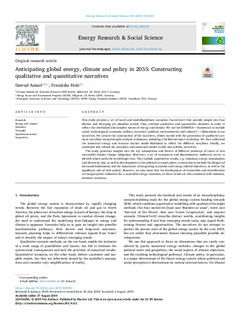| dc.contributor.author | Ansari, Dawud | |
| dc.contributor.author | Holz, Franziska | |
| dc.date.accessioned | 2020-02-06T10:07:53Z | |
| dc.date.available | 2020-02-06T10:07:53Z | |
| dc.date.created | 2019-10-17T14:18:37Z | |
| dc.date.issued | 2019 | |
| dc.identifier.issn | 2214-6296 | |
| dc.identifier.uri | http://hdl.handle.net/11250/2639976 | |
| dc.description.abstract | This study presents a set of novel and multidisciplinary scenarios (‘narratives’) that provide insight into four distinct and diverging yet plausible worlds. They combine qualitative and quantitative elements in order to reflect the interlinked and complex nature of energy and climate. We use the STEMPLE+ framework to include social, technological, economic, military (security), political, environmental, and cultural (+) dimensions in our narratives. We present the construction of the narratives, which started with the generation of qualitative scenario storylines using foresight analysis techniques, including a facilitated expert workshop. We then calibrated the numerical energy and resource market model Multimod to reflect the different storylines. Finally, we combined and refined the storylines and numerical model results into holistic narratives.
The study generates insights into the key assumptions and drivers of different pathways of (more or less successful) climate change mitigation. Moreover, a set of transparent and discriminatory indicators serves to identify which paths the world might take. They include quantitative results, e.g. emissions, energy consumption and electricity mix, as well as developments in the political or social sphere. Lessons learnt include the dangers of increased isolationism and the importance of integrating economic and energy-related objectives, as well as the significant role of civil society. However, we also show that the development of renewables and electrification are inappropriate indicators for a successful energy transition, as these trends are also consistent with emission-intensive scenarios. | nb_NO |
| dc.language.iso | eng | nb_NO |
| dc.publisher | Elsevier | nb_NO |
| dc.rights | Navngivelse 4.0 Internasjonal | * |
| dc.rights.uri | http://creativecommons.org/licenses/by/4.0/deed.no | * |
| dc.title | Anticipating global energy, climate and policy in 2055: Constructing qualitative and quantitative narratives | nb_NO |
| dc.type | Journal article | nb_NO |
| dc.type | Peer reviewed | nb_NO |
| dc.description.version | publishedVersion | nb_NO |
| dc.source.volume | 58 | nb_NO |
| dc.source.journal | Energy Research & Social Science | nb_NO |
| dc.identifier.doi | 10.1016/j.erss.2019.101250 | |
| dc.identifier.cristin | 1738027 | |
| dc.description.localcode | © 2019 The Authors. Published by Elsevier Ltd. This is an open access article under the CC BY license | nb_NO |
| cristin.unitcode | 194,60,25,0 | |
| cristin.unitname | Institutt for industriell økonomi og teknologiledelse | |
| cristin.ispublished | true | |
| cristin.fulltext | original | |
| cristin.qualitycode | 1 | |

